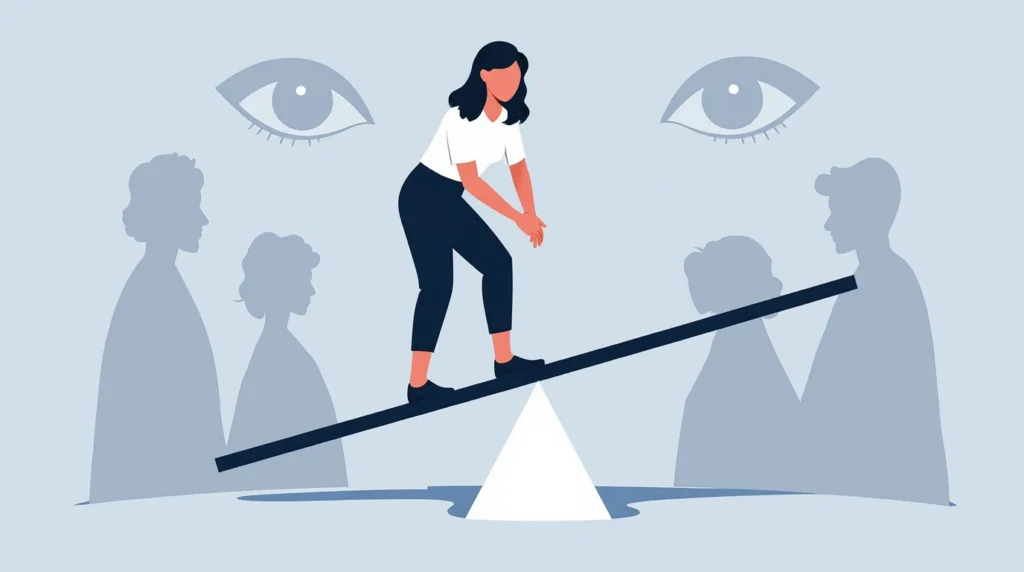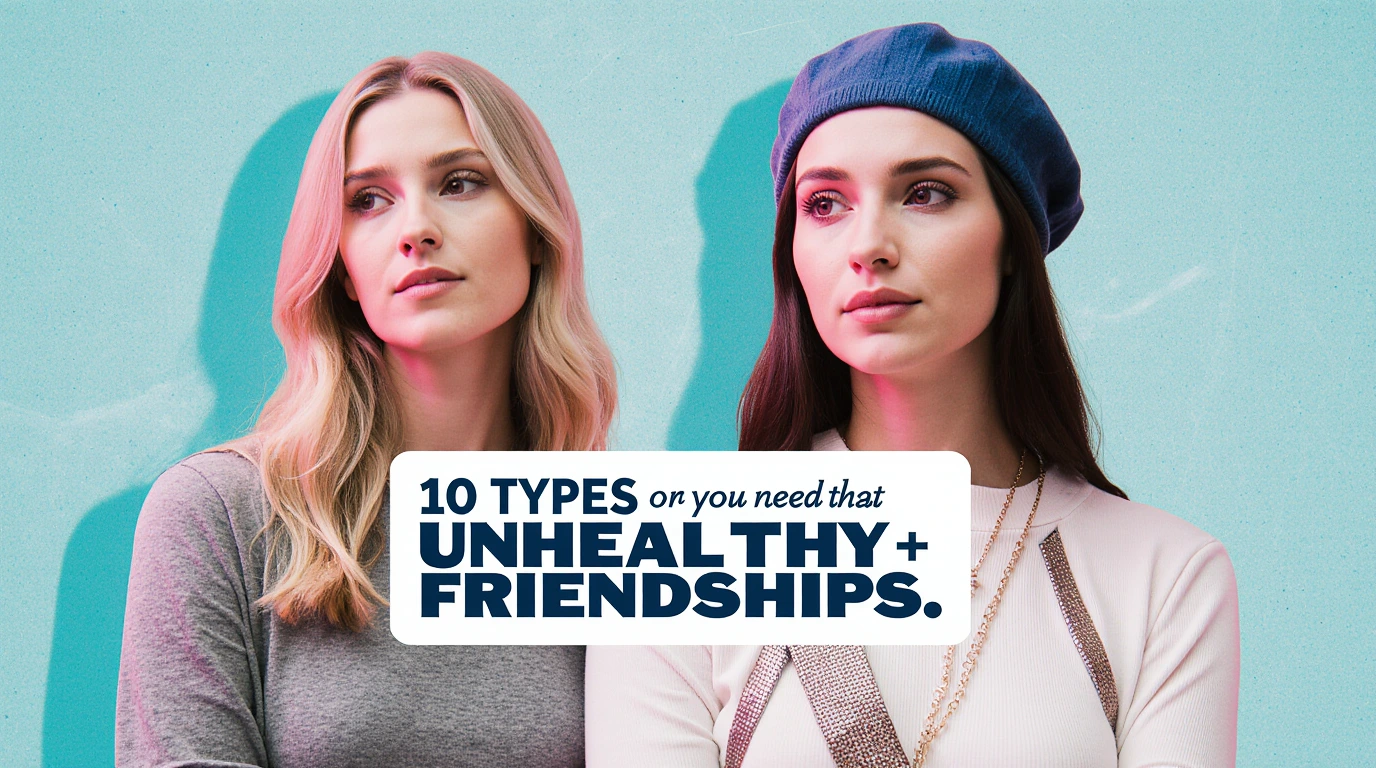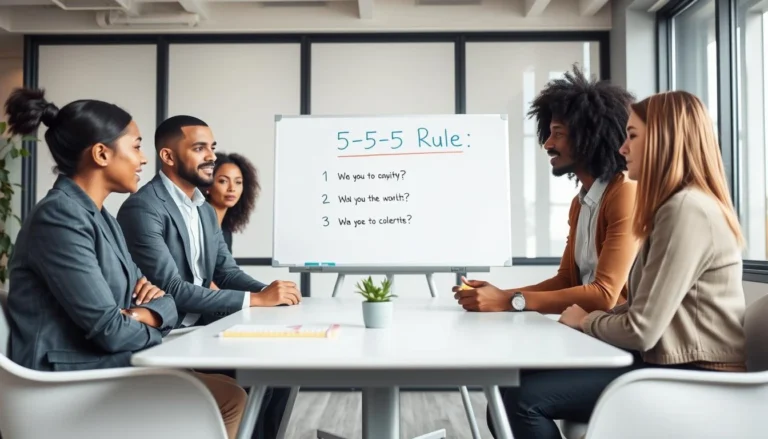Unhealthy Friendships: Recognizing and Letting Go of Toxic Connections
As you approach your 30s, life has a way of prompting reflection. You start to evaluate what truly matters—your career, your health, and, perhaps most importantly, your relationships. Friendships, in particular, play a massive role in shaping your emotional well-being. But not all friendships are created equal. While some lift you up, others can leave you drained, stressed, or questioning your worth. Recognizing unhealthy friendships and toxic friendships is a critical step toward protecting your emotional energy and fostering a life filled with meaningful connections.
In your 20s, you might have collected friends like souvenirs, prioritizing quantity over quality. But as you mature, the focus shifts to cultivating relationships that enrich your life. Toxic friendships, whether marked by negativity, manipulation, or imbalance, can sap your energy and harm your mental health. This article dives deep into the types of unhealthy friendships, their impact, and practical steps to set boundaries and move toward healthier connections. Let’s explore how to spot these draining dynamics and reclaim your emotional space.

Table of Contents
Types of Unhealthy Friendships
Not all friendships are overtly toxic, but subtle patterns can still create a friendship imbalance that weighs you down. Below are ten common types of unhealthy friendships, their characteristics, their impact on your emotional well-being, and advice for navigating them.
1. The Drama Magnet

Characteristics: The Drama Magnet thrives on chaos. They seem to attract—or create—problems wherever they go. Every conversation feels like a soap opera, with exaggerated crises or conflicts that demand your attention. They might blow minor issues out of proportion or drag you into their disputes.
Impact: These friends cause unnecessary stress and emotional turmoil. Their constant need for intervention can leave you feeling like a therapist rather than a friend, draining your emotional energy and pulling you into their whirlwind.
Advice: Identify the Drama Magnet by their pattern of chaos. If every interaction leaves you exhausted, it’s time to distance yourself. Politely decline to engage in their crises and focus on friends who bring calm and balance to your life.
2. The ‘Always’ Unhappy Friend
Characteristics: This friend is perpetually miserable. They complain about everything—work, relationships, life in general—and rarely see the bright side. No matter how much you try to cheer them up, their negativity persists, often dismissing your efforts.
Impact: The ‘Always’ Unhappy Friend can drain your emotional energy like a black hole. Their negativity can pull you down, making it hard to maintain your own positivity and optimism.

Advice: Seek friends who bring light and positivity to your life. While it’s okay to support a friend through tough times, a constant cloud of negativity isn’t sustainable. Limit time with this friend and prioritize those who uplift you.
3. The One-Sided Friend
Characteristics: You’re always the one texting, calling, or making plans. The One-Sided Friend rarely initiates contact or reciprocates your efforts. When you do connect, it feels like you’re carrying the entire relationship.
Impact: This friendship imbalance is exhausting and leaves you feeling unvalued. It’s disheartening to pour energy into a relationship that isn’t mutual, eroding your sense of worth.
Advice: Reevaluate relationships that lack mutual effort. Test the waters by stepping back—if they don’t reach out, it’s a sign the friendship isn’t balanced. Invest in friends who show up for you as much as you do for them.
4. The Judgmental Critic
Characteristics: The Judgmental Critic always has something critical to say. Whether it’s your outfit, your career choices, or your life decisions, they offer unsolicited opinions that feel more like attacks than constructive feedback.
Impact: This friend undermines your confidence and makes you feel judged rather than supported. Over time, their criticism can chip away at your self-esteem, leaving you second-guessing yourself.
Advice: Surround yourself with friends who encourage and accept you for who you are. If their criticism feels constant and unhelpful, set boundaries by calmly addressing their behavior or limiting contact.
5. The Energy Vampire
Characteristics: The Energy Vampire monopolizes conversations, often talking only about themselves or their problems. They’re emotionally demanding, expecting you to be their constant sounding board without reciprocating.
Impact: Interactions with this friend leave you mentally and emotionally drained. You might feel like you’re carrying their burdens while neglecting your own needs.
Advice: Gradually reduce the time you spend with the Energy Vampire. Politely redirect conversations to lighter topics or limit how often you engage. Protect your emotional energy by prioritizing balanced relationships.
6. The Gossip
Characteristics: The Gossip loves sharing others’ secrets and stirring up drama. They might spill your confidences or talk behind others’ backs, creating an environment of distrust.
Impact: This friend makes it hard to feel safe sharing personal matters. Their lack of respect for privacy erodes trust, leaving you wary and guarded.
Advice: Reconsider relationships with those who gossip about you or others. Trust is the foundation of any friendship, so prioritize connections with people who respect your boundaries and confidentiality.
7. The Flake
Characteristics: The Flake frequently cancels plans at the last minute or fails to follow through on commitments. They disrespect your time, leaving you hanging without a second thought.
Impact: This friend makes you feel unimportant and undervalued. Their unreliability can lead to frustration and resentment, disrupting your plans and emotional well-being.
Advice: Value friends who respect and prioritize your time. If the Flake’s behavior doesn’t change after addressing it, consider reducing contact and focusing on dependable connections.
8. The Competitive Friend
Characteristics: The Competitive Friend turns everything into a contest. Your successes become their opportunity to one-up you, and they rarely celebrate your wins without overshadowing them with their own.
Impact: This dynamic undermines your self-worth and prevents genuine celebration. It creates a friendship imbalance where your achievements feel diminished.
Advice: Seek friends who genuinely celebrate your successes without making it about themselves. If the competition persists, distance yourself to protect your confidence and joy.
9. The Manipulator
Characteristics: The Manipulator twists situations to their advantage, often gaslighting or guilt-tripping you. They might make you feel responsible for their problems or question your reality.
Impact: This friend causes self-doubt and is emotionally draining. Their tactics can leave you feeling confused, guilty, or obligated to prioritize their needs over your own.
Advice: Recognize manipulation tactics like gaslighting or guilt-tripping. Set boundaries by calmly asserting your perspective and, if necessary, distance yourself to protect your mental health.
10. The Stingy Friend
Characteristics: The Stingy Friend avoids contributing, whether it’s splitting a bill or offering emotional support. They take more than they give, creating a one-sided dynamic.
Impact: This friendship imbalance feels draining and unfair. You might feel like you’re always giving without receiving support in return.
Advice: Prioritize friendships with equal contribution. Address the imbalance directly, and if it doesn’t improve, consider investing your energy in more reciprocal relationships.
How to End Unhealthy Friendships

Letting go of unhealthy friendships or toxic friendships can feel daunting, especially if you’ve invested years in the relationship. But protecting your emotional energy is worth it. Here’s how to end or distance yourself from draining friendships with grace and confidence:
- Gradually Reduce Contact: Instead of an abrupt cutoff, slowly reduce how much time and energy you invest. Respond less frequently to texts or decline invitations politely, signaling a shift without confrontation.
- Set Clear Boundaries: Protect your emotional space by being firm about your limits. For example, if a friend monopolizes conversations, redirect them to mutual topics or limit call durations. Communicate your needs clearly, like, “I need some space to focus on myself right now.”
- Be Honest (When Necessary): If reducing contact isn’t enough, consider an honest conversation. Focus on your needs rather than their faults. For example, say, “I’ve been feeling overwhelmed and need to prioritize my well-being.” This approach is kind but firm.
- Prepare for Mixed Emotions: Ending a friendship, even a toxic one, can bring guilt, sadness, or relief. Acknowledge these feelings as normal. Journaling or reflecting on why the friendship was unhealthy can help you process the transition.
- Seek Support: Lean on trusted friends, family, or a counselor as you navigate letting go. They can offer perspective and remind you why prioritizing your emotional energy matters. A therapist can also help you work through guilt or self-doubt.
Conclusion

As you navigate your 30s, your time and emotional energy become precious commodities. Recognizing and letting go of unhealthy friendships or toxic friendships is an act of self-care that allows you to build a supportive, positive social circle. By identifying patterns like drama, negativity, or friendship imbalance, you can set boundaries and prioritize relationships that uplift and inspire you.
Surround yourself with friends who celebrate your wins, respect your time, and contribute equally to the relationship. Letting go of toxic connections isn’t about burning bridges—it’s about making space for the people who truly align with your values and growth. For more insights on navigating complex social dynamics, check out our article, “Girls Just Wanna Have Fun (And Not Fight): How To Survive Girls Trip Without Coming Home As Enemies”.
By choosing quality over quantity, you’re investing in friendships that nourish your soul and empower you to thrive.







